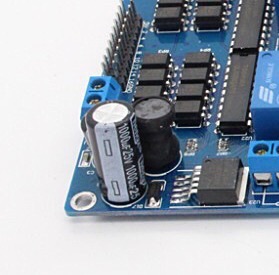Node freezing up
-
I had similar behavior when I accidentally feed 5V to the NRF24L01+ so my guess is a power issue like in most cases. Check the voltage on the NRF24L01+.
-
It happened frequently to me when using relays (inductive load). Spikes on the powerline can easily freeze the radio.
-
It happened frequently to me when using relays (inductive load). Spikes on the powerline can easily freeze the radio.
@AWI
Relays are isolated using opto-couplers so it should`t be a problem.
The relay board is this or very similar:Power goes to the relay board and then it powers the arduino
-
Can you give more details of what your node is? what hardware have you used? do you have a circuit diagram?
-
And you have added a cap for the radio ?
Try to add a blink, just to see if the board crashed/freezes. If not it's properly the radio. -
@AWI
Relays are isolated using opto-couplers so it should`t be a problem.
The relay board is this or very similar:Power goes to the relay board and then it powers the arduino
@ferpando The optocoupler takes care of the load on the Arduino outputs. What I tried to say is that the inductive load of the relays on the power lines can be substantiall. I there is any sharing of power (same supply) of the relay and the radio it is very hard to avoid lock-ups.
below an excerpt from Jeelabs
-
@ferpando The optocoupler takes care of the load on the Arduino outputs. What I tried to say is that the inductive load of the relays on the power lines can be substantiall. I there is any sharing of power (same supply) of the relay and the radio it is very hard to avoid lock-ups.
below an excerpt from Jeelabs
-
@ferpando A common ground is ok (and necessary).. A capacitor can improve things. Many times it is trial & error. What worked for me is having a seperate regulator and decoupling capacitor of 470uF for the feed to the relay. It is hard to read the schematic of the relay board on e-bay but measures like a diode over the relay-coil need to be in (and probably are). Switching inductive loads with the relay can also introduce EM problems.
It's science... using Solid State relays is a long term reliable (short term expensive) alternative. ... good luck, there may be experts around on the forum.
-
@ferpando A common ground is ok (and necessary).. A capacitor can improve things. Many times it is trial & error. What worked for me is having a seperate regulator and decoupling capacitor of 470uF for the feed to the relay. It is hard to read the schematic of the relay board on e-bay but measures like a diode over the relay-coil need to be in (and probably are). Switching inductive loads with the relay can also introduce EM problems.
It's science... using Solid State relays is a long term reliable (short term expensive) alternative. ... good luck, there may be experts around on the forum.
-
@AWI
Looks like it has a regulator and a 1000uF capacitor plus a smaller one.
I'll try to add a second regulator with capacitor just for the arduino and see what happens
-
I have exactly the same Problem. But I'm not sure the relays are the problem.
I've added a keep alive message to know when it stops working and implemented a watchdog. -
I have exactly the same Problem. But I'm not sure the relays are the problem.
I've added a keep alive message to know when it stops working and implemented a watchdog. -
@ferpando You can enable a watchdog timer on your Arduino. If your code hangs your Arduino, it should reset/reboot it. But not sure that would reset the radio.
Found good description -> http://www.megunolink.com/how-to-detect-lockups-using-the-arduino-watchdog/
-
@AWI
Looks like it has a regulator and a 1000uF capacitor plus a smaller one.
I'll try to add a second regulator with capacitor just for the arduino and see what happens
